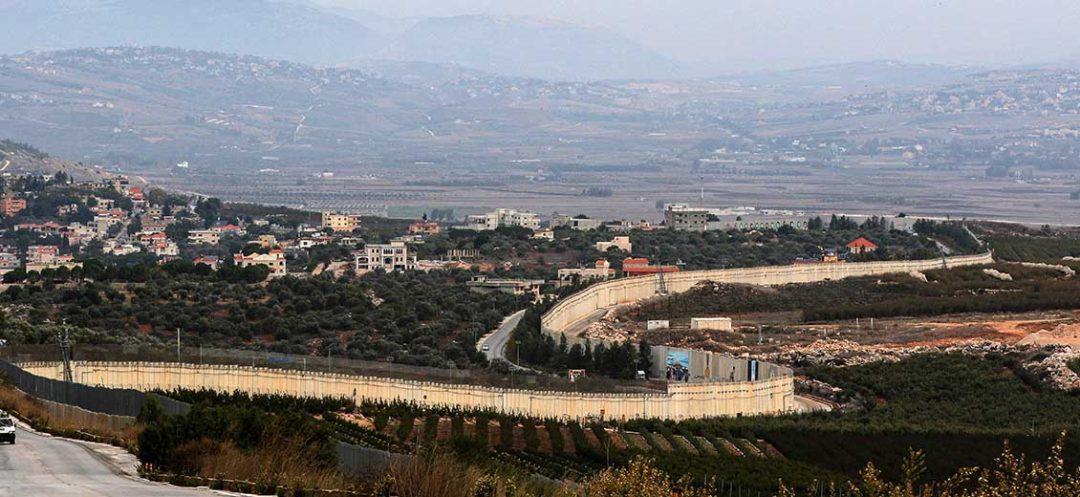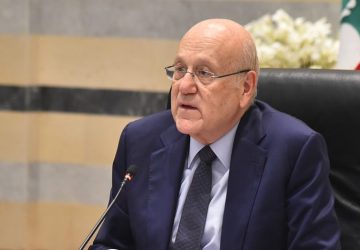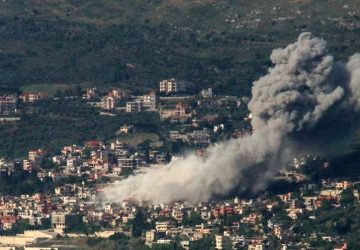For caretaker Prime Minister Najib Mikati, “a three-step plan is essential” to restore peace in the region and allow for the normalization of relations between Saudi Arabia and Israel, following the war between Hamas and Israel that started on October 7. According to him, the first step is to achieve a “ceasefire in Gaza, then the exchange of hostages and finally to establish a permanent peace plan, namely the creation of two states, one Israeli and one Palestinian.”
Mikati made these remarks during a webinar organized by the American Task Force for Lebanon (ATFL) and moderated by its president, Edward Gabriel. He participated in a discussion about the conflict in the region, along with former interim Foreign Minister Tarek Mitri and former US Ambassador to Lebanon Jeffrey Feltman.
Mikati indicated that the situation in Lebanon (which has seen clashes at the southern border between Hezbollah and Israeli forces since October 8), Jordan, Iraq and the Red Sea “is closely linked to that in the Gaza Strip.” In other words, “As long as peace does not prevail in this area, diplomacy cannot advance on all fronts,” Mikati stressed.
In this regard, he said he is “concerned, as the extent of hostilities is an indicator of the risk facing countries in the region.” He thus recalled that “Lebanon opposes war and is fully committed to respecting international resolutions, including United Nations Security Council Resolution 1701, as it is concerned with maintaining long-term stability.” The reason why Resolution 1701 is not fully implemented is that it has been “the subject of 35,000 Israeli violations over the past 14 years,” the caretaker Prime Minister said, insisting, “Let’s start by ending these violations to be able to talk about peace and stability.”
Hence the need, according to Mikati, for stakeholders to “prioritize dialogue and diplomatic processes to avoid any escalation in Lebanon.” He also indicated that it is “imperative to consider redeploying the Lebanese army in the South in coordination with the United Nations Interim Force in Lebanon (UNIFIL), to prepare the ground for negotiations on the land border between Lebanon and Israel, according to the 1949 Armistice Agreement.”
Resolution 1701 and Settlement Perspectives
In its periodic report covering the period from June 21 to October 20, 2023, the UN Secretary-General examined the implementation of Resolution 1701. He expressed, according to Tarek Mitri, one of the architects of this resolution, “some concern about the situation in South Lebanon. This is due to ongoing hostilities, the presence of illegal weapons, Israeli violations of Resolution 1701 and Lebanese airspace and the Israeli occupation of the northern part of the Lebanese village of Ghajar.”
Mitri added that the report highlights “the importance for Lebanon that its army be strong and well-equipped.” The former minister noted that over the span of 17 years (since 2006, when the resolution was adopted, until October 8, 2023), “We have not witnessed major military exchanges at the border, and the situation has been relatively stable.” According to him, Hezbollah, “which has not completely withdrawn from the area between the Litani River and the Blue Line, has limited its military activities there.”
Mitri also delved into the genesis of the resolution before noting that “current diplomatic efforts in favor of the full implementation of Resolution 1701 have all failed so far.” In the absence of achieving a ceasefire, “A long humanitarian pause could create conditions conducive to its implementation,” he explained.
This view was shared by former US Ambassador to Lebanon Jeffrey Feltman. In his intervention, Feltman reiterated that a “ceasefire is necessary to calm the situation and discuss various issues.” He cited, for example, the “presence of the Houthis in the Red Sea, negotiations on the border between Lebanon and Israel and the exchange of hostages between Hamas and Israel.” In the same vein, he rejected the possibility that Hezbollah would be ready for a large-scale war. However, he did not rule out that “military and strategic miscalculations could occur, so the risk of accidental war is high today.”
The diplomat recalled what happened in 2006, referring to the war between Hezbollah and Israel when Hezbollah kidnapped two Israeli soldiers, giving Tel Aviv the pretext it sought to launch a destructive war against Lebanon. In one of his speeches at the time, Hezbollah leader Hassan Nasrallah admitted his mistake by saying, “If I had known.”
According to Feltman, the implementation of Resolution 1701 can be considered as “a de-escalation plan, especially when considering that its adoption depends on other previous resolutions and agreements, notably the 1949 Armistice Agreement.”





